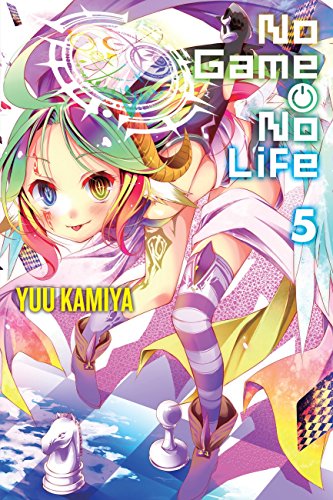By Yuu Kamiya. Released in Japan by Media Factory. Released in North America by Yen On. Translated by Daniel Komen.
I was not quite as grumpy with this volume of No Game No Life as I was the previous one, despite the fact that it has many of the same problems. It could be that it had more interesting things happen – one fight takes up well over a third of the book – or that the denouement of the Siren thing was slightly amusing, which it was – emphasis on slightly. I suspect, however, that the main reason is that this volume was delayed and delayed and then delayed again, to the point where it now hits nine months after the last. Does absence make the heart grow fonder? More likely I was able to settle in after having forgotten literally everything about the last book, and it took a while to recall. The publisher may have figured this out as well – Vol. 6 has already been delayed a month or two as well.
I’ll start my mentioning what I didn’t care for, and then move on to what I enjoyed. As I observed in the previous volume, Sora and Shiro’s development continues to annoy me, mostly as the author has seemingly forgotten that the dichotomy between “invincible gamers” and “social incompetents” was what made them so fascinating. Here, as in Book 4, they almost never have a breakdown or completely lose it. Part of that is the nature of the game they’re playing in the first half – it requires them to be touching, basically, as they have to function as a pair of wings. But I suspect it’s more that the author just enjoys writing them as smug winners. We do get a little bit more time in their heads this volume, which is both good (Sora) and bad (Shiro’s incestuous feelings).
There’s also the resolution of the Dhampir/Siren plot, which was all right, but I wish more had been done to overcome the “Sirens are bimbos” stereotype. As it turns out the way to solve the riddle and wake the princess is simply not to do what she asks for – if you’re an unattainable love that she can never have, you win. Naturally, this is done with a lot of mental and emotional abuse, supposedly justified because she was so annoying, really. And then there’s Plum, whose surprise reveal wasn’t much of one, but whose other revelation – being a secret mastermind manipulating things – worked much better.
And then there’s Steph, who remains the main reason that I’m reading these books. I sympathize with her over the top suffering, of course, but more to the point, she’s developing more and more into a leader and keen observer every book, and people are starting to take notice – particularly Izuna, who is able to get past her verbal tic to realize that Stephanie is not as dumb as she thinks she is, or Sora and Shiro make her out to be. Of course, in the long run, I suspect this is shaping up for Stephanie to rule over everyone once Sora and Shiro win the game. I also liked the backstory with the Flugel race, and how imagination, curiosity, and the desire to create are what they desperately needed – but only Jibril had. There’s hints of some intriguing backstory, which I’d like to see more of.
So overall a mixed bag, and I think those who have been grumpy about this release won’t stop being so. But it’s still worth a read if you can tolerate twinked-out protagonists and their slangey dialogue.

